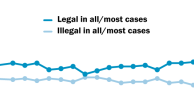CORRECTION (May 23, 2024): A previous version of this report listed an incorrect figure for Hispanic Americans who regularly attend religious services and say they have heard at least a little about climate change in sermons. This has been updated and does not substantively affect the findings of this report.
While many Americans tie their views of the environment to their faith, climate change does not appear to be a major topic of conversation in U.S. congregations. Nearly half of all U.S. adults who attend religious services at least monthly (47%) say they never hear about climate change in sermons, while 44% say the topic is discussed some or a little bit. Just 8% of all U.S. congregants say the sermons at their house of worship mention climate change a great deal or quite a bit, and a similar share (6%) say they talk to their fellow congregants about the issue with such frequency.
Regular attenders at religious services say that when sermons raise the issue of climate change, the theme they hear most often is that they have a duty to care for God’s creation.
While relatively few U.S. congregants say they have high levels of trust in religious leaders to give accurate information about climate change, many say they have at least some trust in clergy – and evangelical Protestants express more confidence in clergy than in politicians to provide information on this issue.
Regular attenders at religious services are more likely to say their congregation has a group that helps people who need food, clothing and shelter, or a group that helps people with alcohol and drug problems, than a group that helps clean up public places or protect the environment. And while many congregants say their congregation has recycling bins (46%) or takes steps to be more energy efficient (43%), far fewer say their house of worship uses solar panels for energy (8%).
Climate change is not frequently discussed in sermons
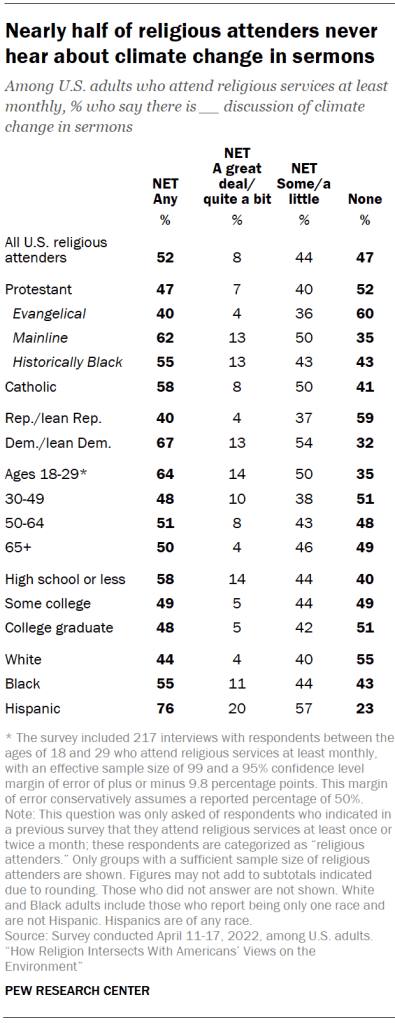
The survey asked U.S. adults who attend religious services at least once or twice a month how often discussion of climate change comes up in sermons at their congregation or place of worship. Nearly half of all regular service attenders (47%) report never hearing about climate change in sermons, while 44% say the topic is discussed some or a little, and 8% report that sermons mention climate change a great deal or quite a bit.
About six-in-ten mainline Protestants (62%) and Catholics (58%) who attend religious services say they have heard at least a little discussion about climate change in sermons. The issue has been a focus for leaders in these traditions, including Pope Francis, as well as Episcopalians, Lutherans and Methodists. On the other hand, a majority of evangelical Protestant congregants (60%) say they have not heard climate change discussed in sermons at all.
Hispanic Americans who regularly attend religious services (76%) are far more likely to say they have heard at least a little about climate change in sermons than are Black (55%) or White (44%) Americans who say they attend a church or other house of worship at least monthly.
Two-thirds of Democratic and Democratic-leaning religious attenders report that climate change has been discussed in sermons at their place of worship (67%), compared with about four-in-ten Republicans and independents who lean Republican (40%). Young adults who attend religious services also are more likely than their elders to say that it is discussed at least a little in sermons at their houses of worship.
When climate change does come up during sermons, what are the broader messages about the topic? Regular service attenders who say they have heard any sermons discussing climate change were asked a few follow-up questions about the gist of those sermons. Of four possible messages asked about in the survey, the most common is that people have a duty to care for God’s creation. A third of all regular attenders (34%) say sermons that address climate change are always or often on this theme. Fewer say they hear messages of support for actions to limit the effects of climate change (16%); concern that policies aimed at reducing global climate change give too much power to the government (11%); or the view that we don’t need to worry about climate change (8%).
Evangelical Protestants, who are least likely to say they hear about climate change in sermons, also are the least likely Christian subgroup to say they hear messages about needing to limit the effects of climate change (8%). By comparison, roughly a quarter of Catholics (23%) and one-in-five Protestants in the historically Black (19%) and mainline (19%) traditions say sermons about climate change at their congregations often or always reflect this message.
Similarly, Democrats and Democratic-leaning regular attenders are more likely to hear about a duty to care for creation (47%) than are Republican or Republican-leaning U.S. congregants who attend religious services at least monthly (24%).
Across all the major U.S. Christian traditions, no more than about one-in-eight regular attenders at religious services say they hear sermons at their congregations that often or always express the concern that policies to reduce climate change give too much power to the government. Likewise, relatively few regular service attenders, as a whole, say they often hear sermons telling them not to worry about climate change.
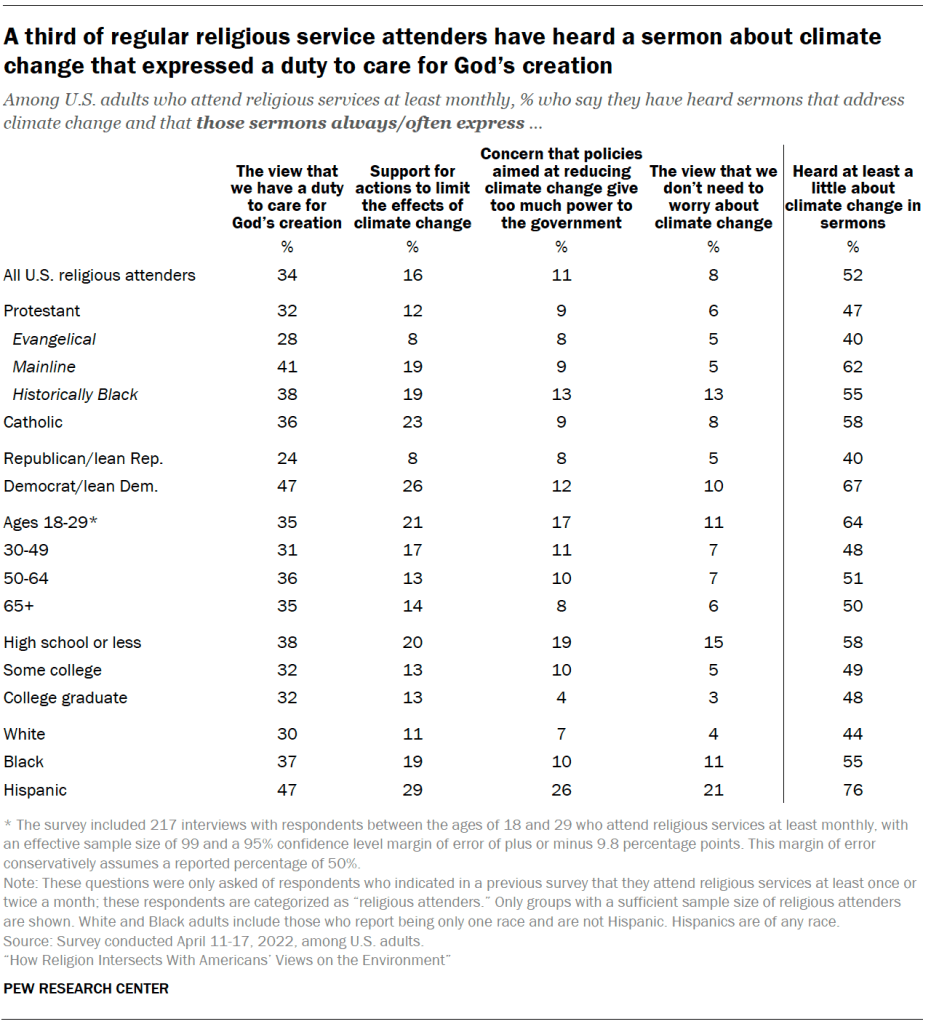
Evangelical Protestants trust clergy members more than media or politicians for information about climate change
The survey asked all respondents to rate how much they trust four groups of people to provide full and accurate information about climate change: elected officials, climate scientists, the news media and religious leaders. Overall, Americans express the most trust in climate scientists: 54% of U.S. adults say they trust climate scientists a great deal or quite a bit to give accurate information about global climate change. By comparison, smaller shares of U.S. adults say they trust the news media (18%), religious leaders (12%) and elected officials (8%) a great deal or quite a bit as sources of information on this topic.
But more than a third of U.S. adults express at least some trust in clergy on climate change, including around half of evangelical Protestants and members of the historically Black Protestant tradition. Evangelical Protestants are more likely to trust religious leaders than to trust elected officials or the news media for information on climate change.
On the whole, Americans who attend religious services at least once or twice a month are much more likely than those who attend less frequently to trust religious leaders to give accurate information on climate change, and less likely to trust climate scientists – although both groups express higher levels of trust in climate scientists than religious leaders.
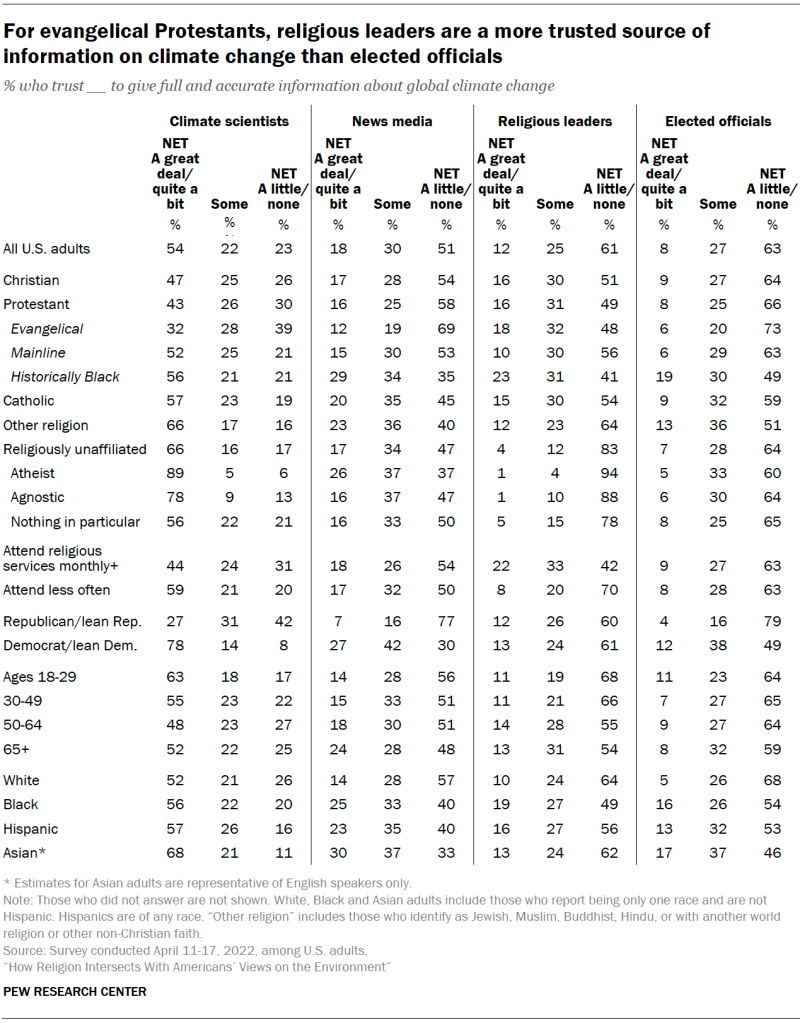
Like the public overall, religious attenders do not talk about climate change often
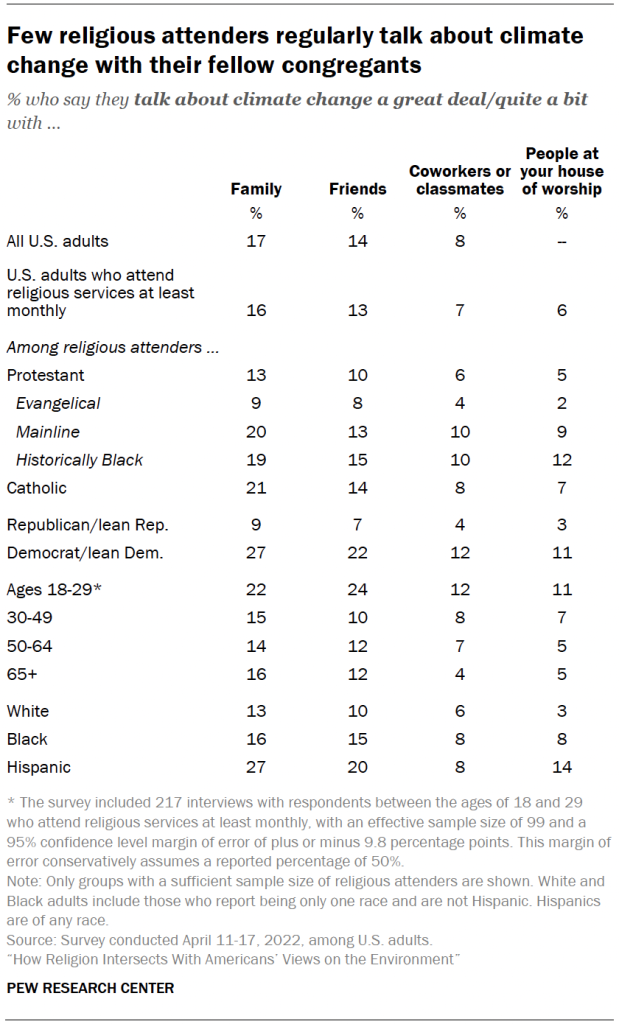
Similar to the share of U.S. congregants who say they have heard a great deal or quite a bit about climate change in sermons at their house of worship (8%), relatively few religious attenders say they frequently talk about the issue with people at their house of worship (6%). Discussing climate change with fellow congregants is more common among Democrats (11%) than Republicans (3%). The same is true for Hispanic adults (14%) who are regular religious attenders relative to White adults (3%) who report that they attend religious services at least monthly.
U.S. congregants as a whole are modestly more likely to discuss climate change at least quite a bit with family (16%) or friends (13%), but still, large majorities do not. The figures are similar for U.S. adults overall (17% and 14%, respectively), suggesting that climate change is not a frequent topic of conversation for most people around the country.
Perhaps not surprisingly given the infrequency of discussions about the topic, nearly half of regular attenders at religious services (48%) say they are unsure if they generally agree or disagree with their fellow congregants about climate change. About one-in-five (22%) say they generally agree with other people at their house of worship, and a similar share (24%) say they sometimes agree and sometimes disagree. Just 4% say they generally disagree about climate change with other people in their congregation.
Fewer regular attenders say they do not know the position their friends (26%), classmates or coworkers (20%), and family members (18%) take on climate change. Regular attenders are most likely to agree with family members (41%), while 32% say they generally agree with their friends on climate change, and 17% agree with their coworkers or classmates. Fewer than one-in-ten regular attenders disagree with family (7%), friends (5%), or coworkers or classmates (4%).
Regular worship attenders less likely to say their congregation has a program focused on the environment than on helping people in need
Among U.S. adults who attend religious services at least monthly, the vast majority say their congregations host programs that serve people who need food, clothing or shelter (85%). Upward of half (55%) say their places of worship also provide assistance to persons struggling with alcohol or drug addictions. Somewhat fewer regular religious attenders (41%) say their congregation hosts a program that helps clean up public places or protect the environment. And 17% of regular attenders say they, personally, are involved in such programs.
Similar shares of attenders across major Christian traditions – including both Republicans and Democrats – say their congregations have programs that clean up public spaces or protect the environment.
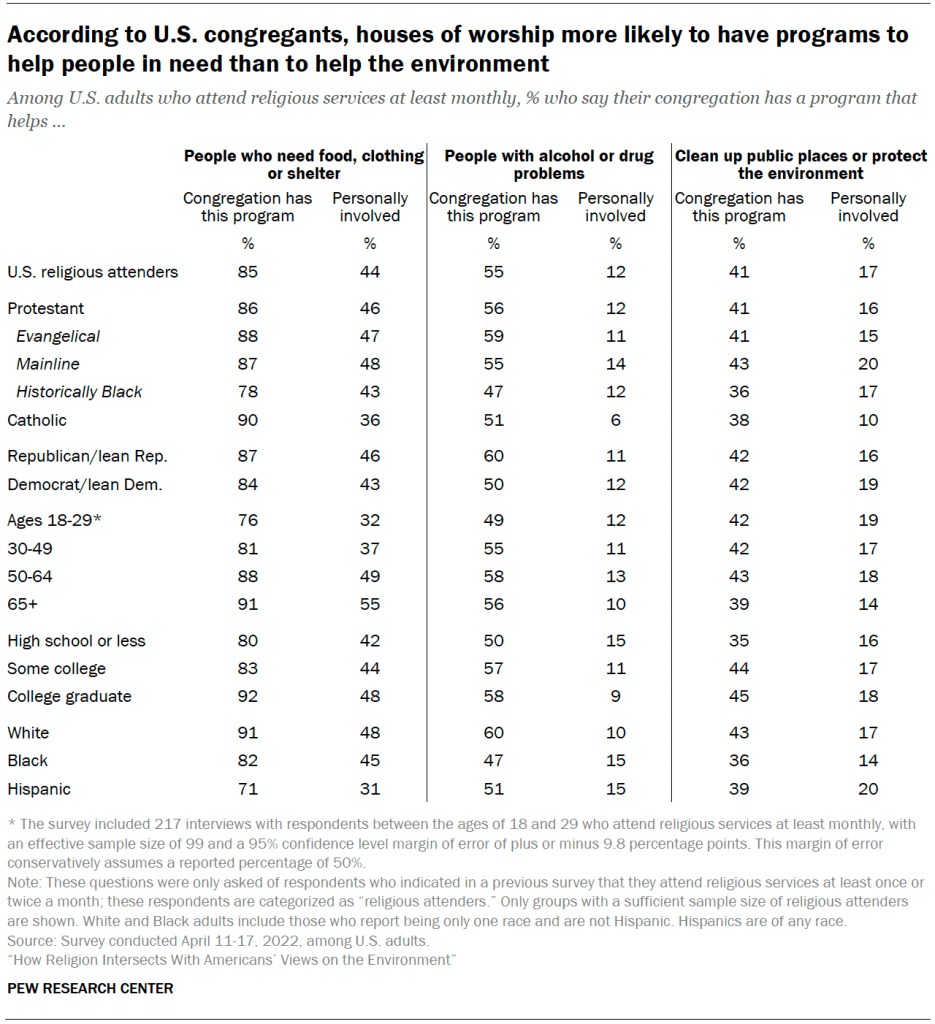
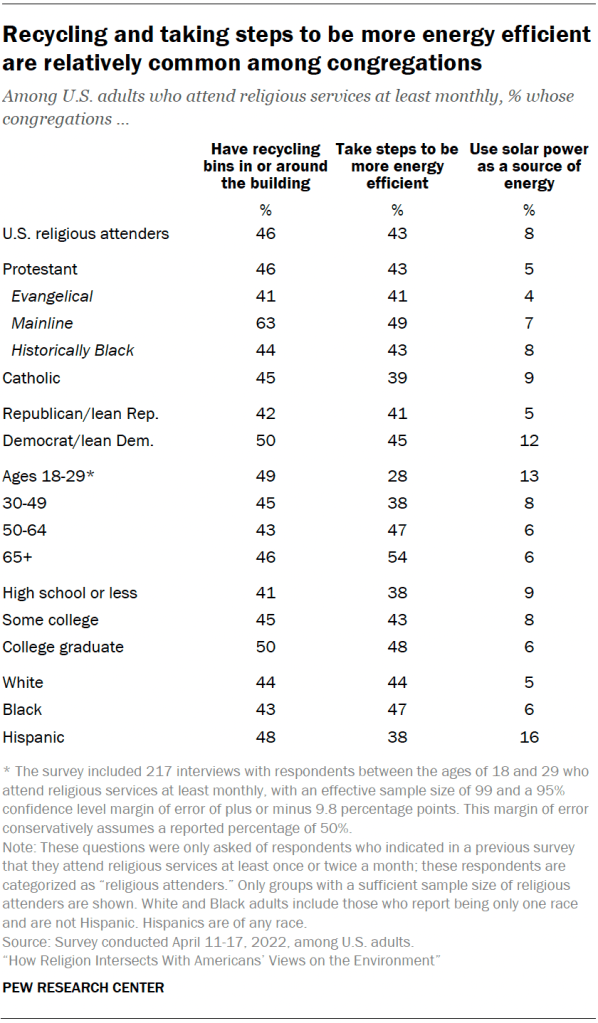
The survey also asked U.S. congregants if their houses of worship have recycling bins in or around their buildings, have taken steps to become more energy efficient, or use solar power as a source of energy.
Nearly half of regular worship attenders (46%) say their congregations have recycling bins, and a similar share (43%) say their places of worship are taking steps to be more energy efficient. In both cases, mainline Protestants are more likely than other Christians to say their congregations take these steps.
Americans ages 65 and older who attend services at least monthly are more likely than younger religious attenders to report that their congregations are making efforts to become more energy efficient (54% vs. 28%).
Regular religious attenders are less likely to say their congregations use solar power as a source of energy (8%), though this is a slightly more commonly reported practice among regular attenders who live in the West (13%) than the South (6%) or Midwest (4%).

